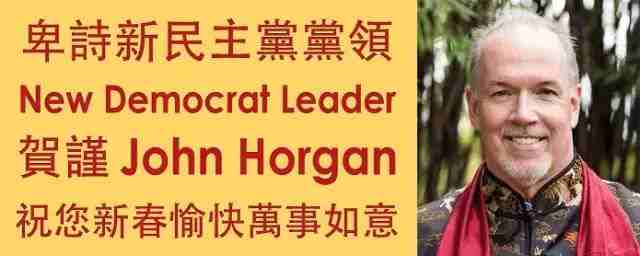谁是加中关系的真正先行者?




声明:加拿大之声出于传递更多信息之目的,并不意味着赞同文章观点或证实其描述。文章内容仅供参考,不对投票构成任何暗示或建议。
原文标题:BC NDP 新民主党: 加中关系的先行者
上次我们谈到新民主党在八十年前力挺华人投票。而且,很多朋友不了解,BC NDP还是与中国人民友谊桥梁的缔造者。
回顾历史,BC NDP省长Dave Barrett可谓是加中关系的先驱。他于1974年首次带团访问中国,是BC省第一位访华的政治家。
NDP的下一任省长Mike Harcourt是温哥华与广州友好城市的主要推手。
BC NDP与中国的交集和友好的态度,是新移民应该了解和值得回顾的。

43年前
态度友好的NDP省长毅然决定访华
43年前的中国与今天的中国有天壤之别。做出访问中国的决定实属不易。
1972年,Dave Barrett带领BC NDP赢得大选。两年后,他的代表团对中国进行了本省第一次访问。Barrett政府认识到中国在国际舞台的重要地位,他认为加强与中国的关系对BC省有深远意义。

这并不是一次简短的访问,也不是表面工作。NDP代表团对中国之行的重视体现在行程上:
他们把中国的北部,中部和南部地区看了个遍。他们去了大庆的油田,参观了北京的学校,上海的工厂和广袤的农村地区。他们亲自去到位于石家庄的白求恩墓吊唁。值得一提的是,他们特别去到了广东的台山地区,因为这是温哥华先侨的重要原居地。
他们的行程处处体现了对中国,特别是中国人民的友好和真诚。

NDP省长的访问,让BC省成为了加拿大,甚至整个西方社会接触中国的先行者。Barrett在42年后故地重游,看到中国翻天覆地的变化,感触万千。42年前的中国一穷二白。如今,各国争先恐后与中国发展经济。我们应该肯定的是NDP省长在中国需要朋友,需要外交,需要信任时的大胆和远见。
继续
NDP省长Harcourt巩固加中关系
Mike Harcourt在1991年带领NDP组成多数政府。而在担任省长前,Harcourt是温哥华市长。他全面推动了温哥华与广州的紧密关系。1985年,Harcourt带领团访问了广州。后来,广州市市长叶选平(后任广东省省委书记,全国政协副主席)回访了温哥华,签署了姊妹城市协议,并于已是省长的Harcourt加强了关系。在叶选平成为广东省长后,BC又与广东省成为友好省份。在九十年代NDP执政的十年里,几乎每年BC省和广东省最高级别官员都会相互走动,关系非常紧密。

如今,BC与广东的贸易非常紧密,签署的贸易协议额甚至超过两国政府互访的订单。这要归功于早期NDP领导人为两国,两省友谊打下的坚实基础。
如今的
BCNDP党领怎么看中国?

NDP的John Horgan(贺瑾)是个开通的政治家。他有海外学历和从商的经验,愿意进一步与中国加强不止是经济,也包括文化的交流。他认为,Barrett的访华是历史的突破,缔造了我们与中国的友好传统。他表示将要继续发扬这个传统,让BC与中国的关系进入新的发展阶段。

其实笔者在撰写文章的同时也学到了很多加中关系中不为人知的历史。也感叹NDP在对华态度上的友好,开通和远见。
此文多处引用了UBC终身教授Dr. Graham Johnson的文章,特在下方附上,供您细读。
Forty Two Years On: Change and Transformation in China and Guangdong
Graham Johnson,
Professor Emeritus of Sociology, UBC
President, BC-Guangdong Business Council
Forty two years ago David Barret, as Premier of BC, led a government delegation on a visit to China, the first provincial premier to visit the People’s Republic of China. Premier Barret had led the NDP to its first majority in the 1972 election, overcoming the W.A. C. Bennet Socreds, and was committed to new policy initiatives. Not least of these was to identify China as a significant player on the global scene, and to suggest that to establish links with China was in the best interests of the province.
The government visit to China came in the wake of visit to BC by the Chinese ambassador to Canada, Zhang Wenjin, itself a first. This in itself had become possible by efforts of the Canadian government to negotiate the terms whereby Canada was able to recognize the People’s Republic of China as the legitimate government of China and exchange ambassadors, changing fundamentally the character of global politics (and the Cold War) and providing a model whereby most countries in the world normalized relations with China, and paved the way for the People’s Republic of China to assume its seat in the United Nations.
The BC government was ahead of its time in sending an official delegation to China. It could not foresee the dramatic changes that would come to China, and the world, in the decades that followed. It established a precedent, which was not immediately recognized, and certainly not followed by the series of Socred governments which followed the NDP defeat in 1976, but resumed when the NDP once again formed governments in the 1990s, by which time China had changed beyond all recognition, as indeed did the global economy.
The China that the government delegation saw in 1974 was very different to the China of today. Premier Barret, his wife, his ministers, and their wives, a union leader and forestry executive, even a Canadian of Chinese origin, travelled to north, central, and south China. They were given a presentation of China’s self, which was to shift after the death of Mao Zedong in 1976, and the domination of Deng Xiaoping who was to introduce dramatic reforms of the Chinese economy, if not the polity, after 1978. Premier Barret and his delegation saw the oilfields of Daqing, rural communes, factories, hospitals, and schools in Beijing, Shanghai, Shijiazhuang (where they visited Norman Bethune’s grave). This was standard fare for the time. In one important respect the visit was distinctive. The delegation visited Guangdong province and went to the home region, Taishan, of the bulk of the early Chinese migrants to Canada. This in itself was a logistical feat. The journey to Taishan, in the western region of the Pearl River delta, was an eight hour journey by road, across five ferries and, for the Premier, a slow journey in a one geared “Red Flag” limousine! The visit to Guangdong and Taishan was of symbolic importance, but had important long term consequences.
Policy changes which began in 1979 began to dismantle the domination of the Chinese economy by the central state. It decentralized decision making from Beijing to the provinces and gave to Guangdong (and adjacent Fujian) an enormous flexibility to innovate, and to encourage some of the “little tigers” of East Asian success in the 1960s and 1970s (not least Hong Kong and Taiwan) to invest and transfer technology and business know-how to China, especially in Guangdong. At the same time, negotiation began with governments of Britain and Portugal for the resumption of Chinese sovereignty over Hong Kong and Macao, which occurred in 1997 and 1999.
First Guangdong, and gradually the rest of China, began to change its economic structure. China has become, 42 years after Premier Barret went to China, an economic giant, and like Britain in the early nineteenth century, the workshop of the world, and a political force of great importance. One of the major growth poles has been Guangdong, which is now Chinese largest province in terms of population (over 100 million), one the richest, and the major exporter in China as a whole.
Canadian business interests have generally been quite timid in dealing with China, and many of our early advantages have not been built upon. One exception to this trend has been in BC where NDP administrations resumed many of the efforts to build relationships with China that Premier Barret had hinted at 35 years ago.
Premier Harcourt became Premier with a second NDP majority in 1991. As Mayor of Vancouver he led an initiative to foster relationships with Guangzhou, the capital of Guangdong, and Vancouver became Guangzhou’s sister city in 1985. The then Mayor of Guangzhou, Ye Xuanping, came to Vancouver to sign the sister-city agreement, and established a friendship with the then Mayor Harcourt. He was to become governor of Guangdong province, and once Premier Harcourt became premier of BC he fostered the interests of BC and the rapidly growing province of Guangdong, led by Governor Ye, and later Zhu Senlin (who had followed Ye Xuanping as Mayor of Guangzhou and then as Governor). In 1995, BC and Guangdong became sister provinces. The 1990s saw visits to Guangdong by BC’s NDP premiers on an almost annual basis. The global economy was shifting and BC’s NDP governments attempted to adapt to the shift.
The links between BC and China, especially Guangdong, have become substantial. Relationships at all levels of government have grown. The Governor of Guangdong made an official visit to BC in 2005, the current Premier has been a regular visitor, and an array of BC municipalities have established friendly relations with several municipalities in Guangdong, and other jurisdictions in China.
China has a growing importance in the global economy. There is enormous potential in the China link, not least in our sister province, Guangdong. There is still hesitation, despite the market for BC’s resources. The western region of Guangdong province is likely to develop rapidly in the coming decade. Its municipalities are anxious to build on the close links which have been developed over the years, which can be traced back to Premier Barret and his foresight.
We can ill afford to miss the boat。


声明:加拿大之声出于传递更多信息之目的,并不意味着赞同文章观点或证实其描述。文章内容仅供参考,不对投票构成任何暗示或建议。
加拿大之声是汉加风平台之子品牌,聚焦于加国政治、财经资讯、社区动态。致力揭示事件背后的深度、温度;传递正义、担当;体现社会责任。旗下品牌栏目:《加拿大骗子曝光台》揭露各类大小骗子、骗术;《汉加风系列》为时事评论;传递百姓之声,为华裔融入加国社会而奔走努力。
新闻线索:[email protected]
最新评论
推荐文章
作者最新文章
你可能感兴趣的文章
Copyright Disclaimer: The copyright of contents (including texts, images, videos and audios) posted above belong to the User who shared or the third-party website which the User shared from. If you found your copyright have been infringed, please send a DMCA takedown notice to [email protected]. For more detail of the source, please click on the button "Read Original Post" below. For other communications, please send to [email protected].
版权声明:以上内容为用户推荐收藏至CareerEngine平台,其内容(含文字、图片、视频、音频等)及知识版权均属用户或用户转发自的第三方网站,如涉嫌侵权,请通知[email protected]进行信息删除。如需查看信息来源,请点击“查看原文”。如需洽谈其它事宜,请联系[email protected]。
版权声明:以上内容为用户推荐收藏至CareerEngine平台,其内容(含文字、图片、视频、音频等)及知识版权均属用户或用户转发自的第三方网站,如涉嫌侵权,请通知[email protected]进行信息删除。如需查看信息来源,请点击“查看原文”。如需洽谈其它事宜,请联系[email protected]。